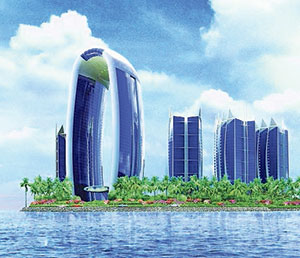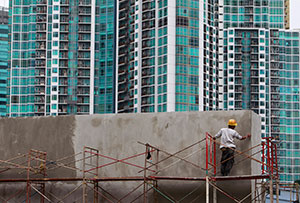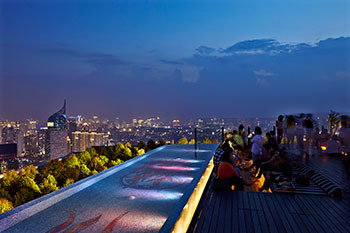Jakarta: high-rise property prices and lower expectations

Simply sign up to the Life & Arts myFT Digest -- delivered directly to your inbox.
Surrounded by putrid water and at risk from floods during the rainy season, seafront living in Jakarta has traditionally been the last refuge of fishermen and slum dwellers rather than the preferred choice of arriviste coal magnates and the progeny of old money.
The four Burj Al Arab-style towers rising into the humdrum skyline on reclaimed land in northwest Jakarta tell the story of a capital city and a property market in flux. When the first three-bedroom apartments at the upmarket Regatta complex, designed by the same architect as the famous Dubai hotel, were sold off-plan in 2006, they went for just Rp3bn ($250,000).
Now the price has nearly tripled to Rp8bn on the back of an economic and property boom that has lined the pockets of well-connected developers and canny investors, but left many aspiring Indonesians struggling to put a decent roof over their heads.
With countless Bentleys, Ferraris and other expensive cars parked in the basement of the Dubai, Miami, Monte Carlo and Rio de Janeiro towers at Regatta, not many of the residents are feeling the heat. Yet, although 90 per cent of the more than 350 apartments have been sold and prices are still rising, Archied Noto Pradono, an executive from developer Intiland, says he is becoming more concerned about the outlook for the Indonesian property market.
“[This] year will be challenging for us, with a lot of noise before the presidential election and interest rates going higher,” he says. “Competition will be tougher and profit margins will be squeezed. In the last two years many big companies have jumped into the property sector and some of these developers will have to pull out.”

Much of the price surge in Jakarta and other hot Indonesian property destinations – namely the second city of Surabaya and the resort island of Bali – came in the past three years, when values jumped by 30 to 40 per cent annually.
“The Jakarta real estate market has been one of the strongest in the world,” says David Cheadle, managing director of the Indonesia office of Cushman & Wakefield, an international real estate broker.
With prices rising faster than in almost any other market in Asia, there were two inevitable consequences. First, a property frenzy as speculators rushed to buy apartments off-plan in the cities and to land-bank paddy fields in outlying areas. Second, the concomitant fears of an emerging bubble. And now, with the central bank having hiked interest rates to the highest level in four years and economic growth having slowed to the lowest level in four years, the property market is starting to cool.

Memories of the last property collapse, during the Asian financial crisis of 1997-98, are still raw among more experienced investors. Half-built offices and apartment blocks from that era dot the traffic-clogged streets of Jakarta. Some landlords are waiting for ever higher prices, while others are locked in long-running ownership disputes. Few analysts believe the same will happen this time because many large developers are funding projects through pre-sales rather than bank loans. “The Indonesian investment market is still very traditional and most people only use time deposits, gold and property,” says Pradono. “When it comes to property, it’s not like China or Singapore, where there’s a lot of leverage. Here most people buy with cash.”
Fitch, the rating agency, believes the property market surge of the past three years looks worrying and predicts that annual price growth is likely to slow substantially, to the 7 to 10 per cent level, due to the higher cost of borrowing and mortgage restrictions introduced by an anxious central bank.

Despite these concerns, Fitch remains optimistic because it believes that, after the devastation of the 1997-98 crisis, Indonesia is coming off a low base and property still looks reasonably affordable compared with other emerging Asian nations. It estimates that in Jakarta it costs the average person 12 years’ salary to buy a home, compared with 13 years in Mumbai, 14 in Manila and 29 in Hanoi – which is still suffering the after-effects of its burst property bubble.
Such statistics are cold comfort to people like 28-year-old Ayu Rahadianty, who works as an account manager at a business centre in the heart of Jakarta. She is one of millions of members of the fast-growing middle class in this nation of 250m people whose increasing spending on clothes, cars and condominiums has driven the economy.
Although Rahadianty got married last year and set a budget for a small family home of Rp500m, she and her husband have been unable to find an affordable apartment in the capital. Instead they have to live with her parents in the satellite city of Bekasi and, like millions of commuters, face a painful congestion-ridden four-hour – or longer – round trip to and from work each day.
“People say the economy has been doing very well, but it hasn’t impacted on me so much because I’m still struggling to find somewhere to live,” she says. “The price and the size are not worth it and I’m very worried because if I can’t buy a house now, next year the price will rise more and it will be even harder.”

A major part of the problem for young would-be homebuyers, as well as property developers, is the strange physical and social geography of Jakarta. From the terrace of the Skye Bar on the 56th floor of the BCA building, which is popular with wealthy young Jakartans, it is possible to see large clusters of skyscrapers throughout the so-called Golden Triangle, where many of Jakarta’s high-end offices and apartments are located within the three main central roads of Jalan Jendral Sudirman, Jalan HR Rasuna Said and Jalan Gatot Subroto.
Nestled between the towers, and stretching beyond them as far as the eye can see, are crowded low-rise residential areas known as “kampungs”, from the Indonesian word for a village. Often built without permission or formal land title, these areas are hard to develop.
Unlike authoritarian China or Vietnam, where Communist party officials and their cronies habitually help property companies bulldoze such dwellings in the name of mutual profit, Indonesia is a functioning if chaotic democracy and land acquisition is a complex and uncertain process.

So the amount of land available to develop in the centre of Jakarta and other big Indonesian cities remains limited. That has created a relatively new and fast-growing market for downtown apartment rentals. A couple of years ago, when rental yields for small two-bedroom apartments in central Jakarta were more than 10 per cent, a number of individual foreign investors – many already based in Jakarta or working in finance in Singapore – snapped up properties.
Although Indonesian law prohibits foreigners from owning freehold, there are a number of ways around the restrictions for those with a high appetite for risk.
Some bought apartments on 25-year leases. Many others purchased property using nominee agreements with Indonesian citizens, whether a business partner, friend or spouse. These agreements may appear reassuring but they are not valid under local law.
While property prices in the financial centres of Singapore and Hong Kong have rocketed beyond the reach of even many wealthy bankers, Indonesia still seems relatively affordable to individual investors without a small fortune. “The price entry point makes it attractive because you don’t need to be a millionaire,” says one Singapore-based banker who bought an apartment for rental in Jakarta through a nominee agreement. “You could get an apartment in the Golden Triangle for $70,000, with a yield over 10 per cent and good prospects for capital appreciation.”

The near 30-per cent slide in the value of Indonesia’s rupiah against the US dollar over the past year has hit foreigners with rental incomes in Indonesia. On the other hand, the depreciating currency should make the sector more attractive to new foreign buyers, except that the price of rental apartments has doubled in the past three years and yields have halved to about 5 per cent.
Still, analysts believe that the long-term prospects for the property market in Indonesia remain strong, underpinned by domestic market buyers. “The last peak in the property market was in 1996 and we’re still not back to that level yet,” says Cheadle of Cushman & Wakefield.
Pradono agrees with this positive outlook: “In the medium term there’s still a great opportunity in Indonesia, with the fast-growing middle class and much infrastructure still to be built in Jakarta and the rest of the country.”
Ben Bland is the FT’s Indonesia correspondent. Additional reporting by Irene Astuti in Jakarta
——————————————-
The accidental property player
Ardit Alrahman was a junior accountant in PwC’s Jakarta office earning just Rp3m ($250) a month before he became a property investor by accident.
His new career began when he bought a tiny 35 sq metre, two-bedroom apartment within a new 18-tower development called Kalibata City in south Jakarta in 2009.
Borrowing money from family members and taking advantage of the instalments offered by the developer, he was just about able to afford the Rp158m price for what was meant to be his home.
When he saw that the prices of such properties were rising by as much as 30 per cent a year, he decided to go into the property business himself, gathering more money from his family in order to buy apartments and flip them or rent them out.
Prices at Kalibata City, a vast development popular with students, young professionals and small families, have nearly tripled since Alrahman bought his first apartment.
Despite the recent cooling, he remains stubbornly bullish about the market. “These people cannot afford houses and they don’t want to live far away from the city so they have no choice but to live in apartment blocks like this, whether they rent or buy,” he says.
——————————————-
Buying guide
● Foreigners who live in Indonesia can buy some leasehold property for a maximum initial period of 25 years. The government is considering extending this but not any time soon
● Foreigners who take their chances with nominee agreements will need their nominee’s backing for amending the property and selling it, not just buying it
● Marrying your nominee – or nominating your spouse – is no guarantee that they will not take your property
● Both buyer and seller must pay 5 per cent tax on the value of the property when it is transferred. The price of many transactions is, therefore, deliberately underreported
● Jakarta has a long rainy season from November to June. Parts of the city flood regularly between December and February
● Violent crime against foreigners is very rare in Jakarta and most apartment complexes are guarded by 24-hour security
What can you buy for . . .
Rp1bn ($84,000) – A two-bedroom, 74 sq metre apartment, in need of refurbishment, in the Taman Rasuna complex
Rp3bn – A two-bedroom, 71 sq metre new apartment above the Kuningan City shopping mall
Rp6bn A two-bedroom, 130 sq metre apartment in the Verde development
Comments